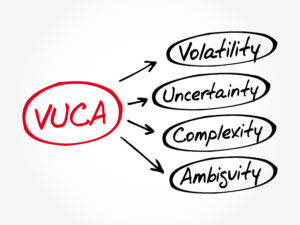 Five years ago, I wrote a post titled VUCA and Educational Leadership. As a quick recap, VUCA describes the challenging environment we live and work in (probably more applicable now than previously!):
Five years ago, I wrote a post titled VUCA and Educational Leadership. As a quick recap, VUCA describes the challenging environment we live and work in (probably more applicable now than previously!):
- Volatility – We live in a world of rapid change driven by an overwhelming volume of information.
- Uncertainty – Our environments are characterized by our inability to know everything for certain, making it difficult to predict outcomes.
- Complexity – Multiple parts/components of a problem make it difficult to understand.
- Ambiguity – Different interpretations of events are further blurred by cultural differences and diversity of thought.
In that post, I reflected on how we as leaders should buffer those in the system from VUCA (more like what I would now refer to as “noise”). As with most of my thinking, it has evolved over this short time period. A better question now might be, How might we help educators and learners thrive in a VUCA world?
It’s like when we block websites and take away technology. Buffering people from the VUCA elements will only make it more challenging for educators and learners to manage VUCA outside the classroom and when they leave the system. As leaders, we should be designing organizational cultures and learning environments that provide opportunities for stakeholders to gain the skills to manage the elements of VUCA, not outright avoid them.
As leaders, what can we promote that allows stakeholders to productively engage in VUCA environments, and what could we be eliminating that is not productive in developing the skills of effective coping and management?
Of course, I’d have to answer by saying let’s start with the learner-centered lens. Since a VUCA world is already at our fingertips, how about we engage in real-world problem solving? How can we get educators and students out in the “real world” tackling volatile, uncertain, complex and ambiguous problems? Let’s think locally, regionally, nationally and globally. How can internal and external stakeholders come together to synergize around these issues and effectively achieve significant work in VUCA environments while developing skills? We can only imagine the competencies that would be developed (and the standards that could be checked off)! And with such depth and authenticity!
As leaders, let’s also avoid elevating experiences that solely feed the needs of the system––standardized accountability, educator evaluations, operational issues that aren’t viewed as deep learning opportunities. Yes….let’s avoid these kinds of distractions.
Why design more learning environments and challenges reflective of VUCA? What might be some of your first steps?
Connect with Randy on Twitter, the TLTalkRadio podcast, and the Shift Your Paradigm podcast!
Get new content delivered to your inbox and the ebook 3 Key Principles of Digital Transformation. The ebook contains valuable information from my experience leading a digital transformation and working with a variety of stakeholders over the past decade.
- A silver lining - January 22, 2022
- Is our use of tech working against us? 🤔 - September 8, 2021
- What’s NOT going to change in the next 10 years? 🤔 - September 7, 2021